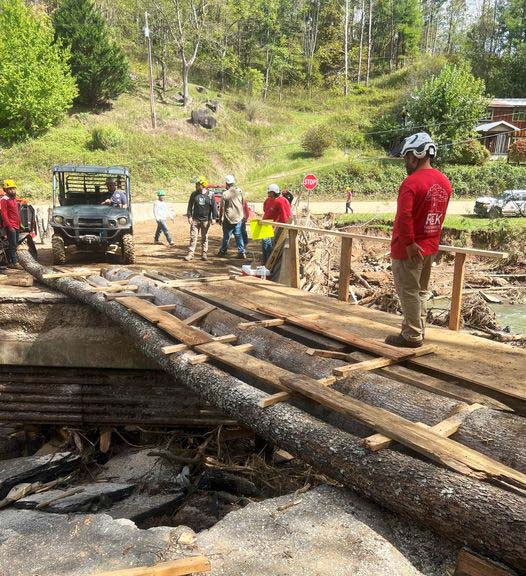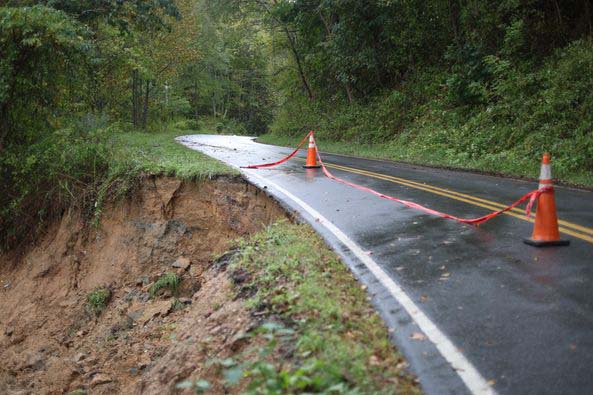
For 42 hours, not one of French Broad Electric Membership Corp.’s 42,000 meters were spinning.
Not in the riverside town of Marshall, North Carolina, which Helene coated with muddy glop, or mountain communities like Pensacola and Bowens Creek, washed away by torrential rains, or in Burnsville, where the Cane River rose 30 feet in five hours.
So, in the darkness, French Broad EMC took what small steps it could, fixing close-in broken poles around the co-op’s home base of Marshall so some members had access to food, gas and clean water once transmission service returned.
Then, the co-op dug in for a long and heart-wrenching haul, knowing what power means to its western North Carolina territory that will scuffle to recover for months, if not longer.
“Hopefully we’re bringing hope to more communities tomorrow and the next day and the next day,” said CEO Jeff Loven, who estimated the storm permanently swept away 2% to 3% of French Broad EMC’s existing meters.

“I know people are struggling and there are actually some things more important than electricity. But, at the same time, electricity is pretty vital to our lives. Especially as we get into these winter months, it will become more of a necessity.”
French Broad EMC is one of four co-ops in western North Carolina looking at indescribable damage as relentless rains pushed power systems, roads and even villages off Appalachian hillsides and into flooded valleys.
That group of co-ops—which includes Lenoir-based Blue Ridge Energy, Forest-City based Rutherford EMC and Waynesville-based Haywood EMC—had about 23,000 members without power 11 days after the storm. French Broad EMC accounted for more than 10,000 of those, mostly in Mitchell and Yancey counties, north of hard-hit Asheville.
In some remote areas, assessing damage, much less repairing it, was nearly impossible despite the influx of personnel—French Broad EMC alone had more than 250 employees, contractors and outside utility workers on its system.
“The bridges are gone, the roads are gone. There are a lot of areas that we can’t even get into other than flying over them,” Loven said. “Candidly, we’ve got so much work right now that we have to fix a lot of other things before we can get close to getting out to those very remote areas.”
Storm surge
Serving parts of seven counties in North Carolina and two in Tennessee, French Broad EMC, named for the scenic river that wanders through its territory, was already saturated from rain before Hurricane Helene made landfall in Florida late Sept. 26 and tore its way northward.
In a social media post that day, French Broad EMC urged members, especially those with hardship medical conditions, to prepare for extended outages.

Loven said the mountainous land, one of the area’s most appealing features to residents, visitors and tourists, was a trap waiting for Helene to spring.
“I’ve seen what three or four inches of rain has done up here, so I knew eight to 12 inches, which is what they were forecasting, was going to be devastating,” said Loven, a native of the area who has been at 117-employee French Broad EMC since 1994.
“When it rains in these mountains and it falls down to those valleys, it picks up speed and it picks up volume. By the time it gets down to where people are in the bottom of the valleys, it’s got a lot of water and it’s got a lot of velocity. And that is a bad combination.”
Add wind gusts of 60 mph or more for 12 hours, and about half of French Broad EMC’s membership was without power by daybreak on Sept. 27. Most of its 4,000 miles of line was damaged in some way; Duke Energy’s transmission issues factored in darkening the entire co-op.
That was the least of the issues, though. Helene turned a power crisis into a community crisis.
The stories are sad and endless. One of Loven’s relatives awoke at 3 a.m. to raging waters surrounding the family’s house in a community near Burnsville in Yancey County. The family rushed to another relative’s residence on higher ground, sat on the porch and watched as their home and possessions disappeared.
They were fortunate in that they are alive. North Carolina officials reported at least 79 deaths in the state related to Helene and that number was likely to climb as responders reached communities that slid off the side of a mountain into a rocky, muddy abyss.
Search-and-rescue teams had evacuated, rescued or assisted more than 6,500 people, according to the state Department of Public Safety. Officials in Buncombe County, which has about 7,000 French Broad EMC members, warned that the river should be approached as a hazmat site so investigators can check out its quality.
“We’re still trying to track down people and missing folks,” Loven said. “It was just such a shock. I’ve never really been in a situation where you can see it in most people’s faces. It’s almost like a bad dream and a disbelief: ‘I can’t believe this is happening to me.’”
Long road back
There is a little town of about 500 named Bakersville in Mitchell County; Loven has particular affection for it because he grew up there. It lost power on Sept. 26 when both transmission feeds into the co-op system failed.

For a couple of days, lineworkers labored to cut trees from 18 miles of transmission lines. Everyone was overjoyed around dinner time on Oct. 2 when crews finally closed the breaker to light up 400 to 500 homes.
It failed. More trees probably fell on lines in the interim. The disappointment in Loven’s voice was evident as he lined up an engineer in a helicopter to find the fault.
“It was getting dark and you can’t see, so we had to leave. It would have been nice for us at the end of a long day. But it just wasn’t meant to be.”
Late the next day, the town was finally with power. But the incident characterizes the long road ahead for French Broad EMC and neighboring co-ops: Despite 16-to-18-hour days, gains will often be incremental, a few members at a time. Where do you mount a power pole if the ground around the old one has eroded down a mountain? How do you string lines by the side of a road if the road is no longer there?
“In some places, there’s nothing left there to build on,” said Loven, convinced that a series of mini-tornados struck Mitchell County. “There was so much wind damage. Every line we have been on is just covered with fallen trees and broken poles.”
For now, scout teams evaluate areas each day by substation, determine what can be accomplished and draw up a list of needed materials, with hundreds of poles at the top. In some cases, workers have carefully constructed temporary bridges to get to trouble spots.
“Then the next day, we send the crew out to try to repair that and fix it. They have a plate full of work orders that they go do. So we just tackle them day to day,” Loven said. “We’re driving down the main three-phase line, repairing it and trying to get sections back on so we can get a few people on every day.”
Housing the people to reconstruct the system is a challenge. Unlike parts of the Southeast, there is no massive open ground to establish large-scale basecamps. In Marshall, the French Broad River normally runs at about six-and-a-half feet; it crested at 20.1 feet during the storm, leaving the town barely suitable for long-term workers.
For now, line crews are in local hotels and a converted church with cots and showers. Appreciative members are washing lineworkers’ clothes and bringing them foods and drinks. French Broad EMC is looking at ways to concentrate mobile housing for the months ahead, but National Guard personnel and other responders already have claimed all the town parking lots.
Teams of mutual aid crews, co-op workers and contractors will be rotated in and out for the foreseeable future, especially with little to no end in sight. Loven wants to make sure French Broad EMC lineworkers get some rest because of the unbelievable physical and mental strain.
“I know everybody wants their power back on tomorrow, but these people are not robots,” he said. “The biggest thing here is safety. That’s more important than anything. Everybody is going to get at least a day off pretty quickly because we want them to stay mentally sharp when they are out there.”
The cooperative spirit
If the situation at French Broad EMC sounds glum—for good reason—the cooperative spirit remains high. Workers have restored an amazing number of members to the grid considering they started from zero. Duke’s repairs are nearly complete, which means French Broad EMC doesn’t have to cope with as many transmission issues.

The co-op has made substantial progress in a couple of its districts and got its Micaville substation back in service Oct. 2, with another hopefully to follow. Some Tennessee members came back online as well.
When French Broad EMC closed a breaker to power up Mars Hill University east of Marshall, it was as much a victory as if the school had won a big football game. “Hearing the kids on campus yell and scream over getting their lights and Wi-Fi always puts a smile on our face,” Loven told members.
In fact, Wi-Fi has been a bright spot amid the disaster. French Broad EMC has a very successful broadband network that recently signed up its 10,000th customer. In the wake of the storm, the co-ops deployed a free Wi-Fi service called SmartTown to more than 1,600 hotspots in its service territory.
“Probably the biggest thing that nobody thought about is, ‘What do you do when you don’t have internet?’” Loven said. “We were putting those hotspots out so that people could talk to their loved ones and make calls and just get information out.”
At some point, power will be restored to every meter that can accept it, thanks to the dedication and resilience of lineworkers who probably have never been in Weaverville or Jacks Creek or Relief in western North Carolina and may never set foot there again.
“This was the day we always dreaded,” Loven said. “We always joked about, ‘Hey, when somebody else is in need, we’ve got to go because one of these days we may need a little help.’ And I guess this is our day. It very well could be somebody else next time because nobody in this area would ever dream this could happen to us.”
Steven Johnson is a contributing writer for NRECA.
Earlier Coverage of Hurricane Helene:
- ‘A Day at a Time, a Piece at a Time’: The Tough Task of Rebuilding
- Co-ops Face Grueling Restoration Work in the Wake of Helene
- For Co-ops Grappling With Helene’s Destruction, It’s All Hands on Deck
- Line Crews Lean on Cooperative Spirit in the Wake of Helene’s Destruction
- ‘This Is an Unprecedented Situation’: Co-ops Pick Up the Pieces After Helene
- Hurricane Helene: Tracking the Co-op Response
- Co-ops Faced With 1.25 Million Outages in the Wake of Hurricane Helene